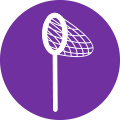PUBIC LICE (CRABS)

What is it?
Pubic lice ('crabs') are tiny insects that live in coarse human body hair, such as pubic hair. The lice use their claws to grab and hang on to pubic hairs while feeding on blood.

How do you get it?
Pubic lice are passed on by close skin contact. Having close bodily contact with another person who is infected spreads pubic lice. Pubic lice can survive for some time away from the body so it is also possible to catch them by sharing clothes or someone else’s bed.

Symptoms
Pubic lice bite and cause itching and red or blue spots in the genital area. This itching is due to the pubic lice biting and causing irritation. You may notice dark brown specks of old blood in your underwear. You may notice lice or eggs in your pubic hair.
If you have pubic lice in your eyelashes you might get red eyes.

Is it serious?
Pubic lice is easy to treat and does not lead to any serious health problems.

How do you get tested?
Often you can confirm the presence of pubic lice as they can be seen moving in the pubic hair. There is no specific test for pubic lice.

Treatment
Pubic lice can be treated with insecticide creams or over-the-counter shampoos such as Permethrin. Used as directed, reapplication may or may not be necessary.

Prevention
To avoid catching pubic lice again, you should make sure that sexual partners are treated as well, and wash articles that may be infected in hot water, such as bedding and clothing currently being worn.

Telling your sexual partner/s
It is important that you tell your sexual partner/s if you have pubic lice so that they can also be treated as necessary.



